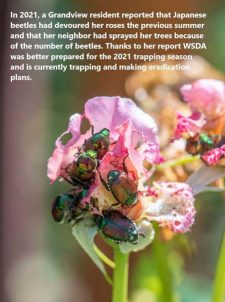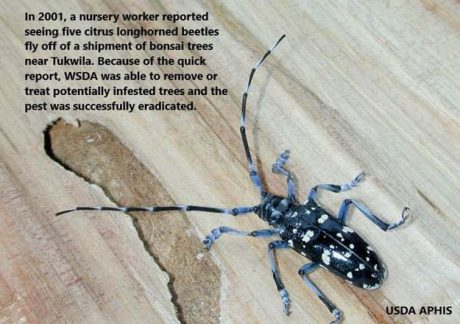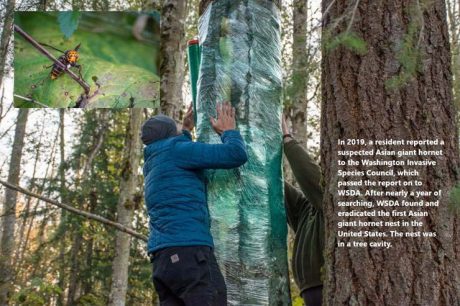State Officials Ask You to Check Your Trees for Invasive Insects
Posted August 2, 2021 at 5:42 am by Tim Dustrude
 Olympia – Are invasive species hiding in your trees? State officials ask you to check trees, lights, outdoor equipment and standing water in your yard for harmful bugs as part of National Tree Check Month in August.
Olympia – Are invasive species hiding in your trees? State officials ask you to check trees, lights, outdoor equipment and standing water in your yard for harmful bugs as part of National Tree Check Month in August.
“August is the ideal time to look for invasive insects and report any species that seem out of place,” said Justin Bush, executive coordinator of the Washington Invasive Species Council. “Trees, lights and standing water (such as pools, dog bowls, buckets, birdbaths, etc.) near homes are great places to look for insects. Trees provide natural habitat, and lights and standing water can act as traps.”
“Checking yards regularly plays a critical role in protecting Washington’s unique environment from the destruction that invasive pests can cause,” said Karla Salp, public engagement specialist for the Washington State Department of Agriculture. “Alert residents can help spot infestations when they are easy to handle. This not only saves time and money, but more importantly significantly limits the damage that invasive pests cause to our gardens and yards, local and national parks and farms and forests.”
Residents who find a suspected invasive insect are encouraged to take a picture and report it via the Washington Invasive Species Council mobile app or website. The council then will connect residents with organizations that can help. Private owners of non-industrial forestland in Washington also may be eligible for assistance from programs administered by the state Department of Natural Resources.
“We need your help to find and report invasive species,” Bush said. “Invasive insects can be tree killers. They pose a significant risk to our communities, public lands and natural resources. If not found and stopped quickly, a new invasive species could cost millions if not billions in economic and environmental impacts.”
How to participate:
- Search trees, outdoor light fixtures, outdoor equipment and standing water for signs of invasive insects.
- Report sightings
-
- If a suspected invasive insect is found alive, take a photograph and submit a report with details to the Washington Invasive Species Council either through the mobile app or website.
- If a suspected invasive insect is found dead in lamps, pools, etc., please take the following steps:
- Collect the insect and dump the contents of the container onto a white background (such as a paper plate, piece of paper, or paper towel).
- Place a coin next to the insect for size reference and take a photograph of the entire contents.
- Place the contents into a zip-lock bag for safe storage. Entomologists may ask you to mail the specimen to a lab for identification.
- Report siting to the Washington Invasive Species Council mobile app or website.
- Repeat process as many times as you’d like!
If getting up close and personal to insects isn’t your thing, you still can contribute to National Tree Check Month by taking these simple actions to prevent the spread of unwanted pests:
- Don’t move firewood. Buy firewood where you’ll burn it or gather it on site when permitted. If you move firewood, you also might be moving invasive insects hiding there.
- Don’t move a pest. When traveling locally or moving to a new area, check your bags, outdoor gear and boxes to make sure they are insect free. Invasive insects, which can be in any life stage from egg to adult, can tag along easily in bags, equipment and boxes and on items that have been stored outside or in your garage.
“Invasive insects can cause severe damage to trees, whether in your backyard or on state lands across Washington,” said Glenn Kohler, a forest entomologist for the Washington Department of Natural Resources. “Early detection is crucial to preserving our natural resources. The bottom line is that it only takes a few minutes to check your trees, lights and standing water. It’s an easy thing that everyone can do to be a part of the effort against the ongoing forest health crisis in Washington.”
Additional Resources
- Washington Invasive Species Council website
- Washington Invasive Species Council Priority Insects webpage
- Washington Invasive App and Reporting webpage
- Washington’s Urban Forest Pest Readiness Plan webpage
- Washington Department of Natural Resources Insects and Disease Monitoring webpage
- Washington Department of Natural Resources Forest Stewardship and Landowner Assistance webpage
- Washington Department of Natural Resources Urban and Community Forestry Program website
- Washington State Department of Agriculture Pest Program website
You can support the San Juan Update by doing business with our loyal advertisers, and by making a one-time contribution or a recurring donation.
Categories: Animals, Environment, Wildlife












No comments yet. Be the first!
By submitting a comment you grant the San Juan Update a perpetual license to reproduce your words and name/web site in attribution. Inappropriate, irrelevant and contentious comments may not be published at an admin's discretion. Your email is used for verification purposes only, it will never be shared.